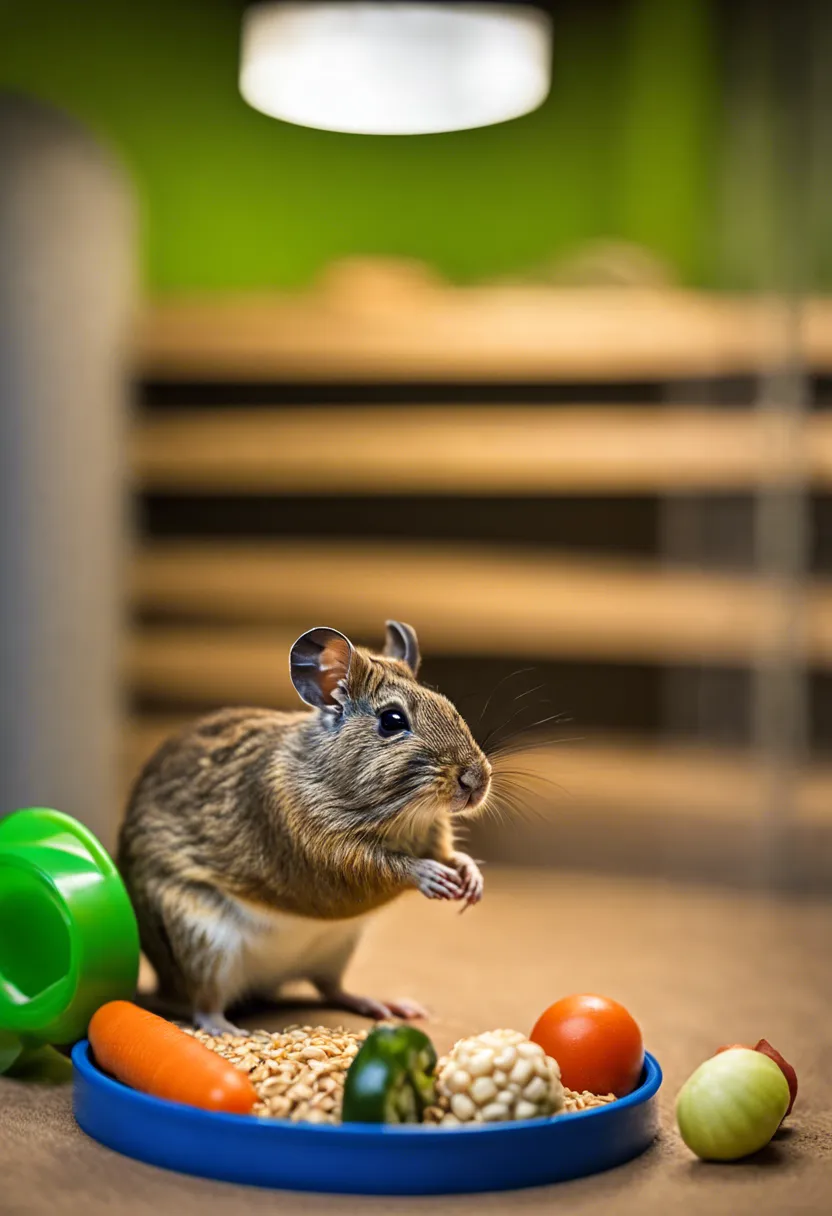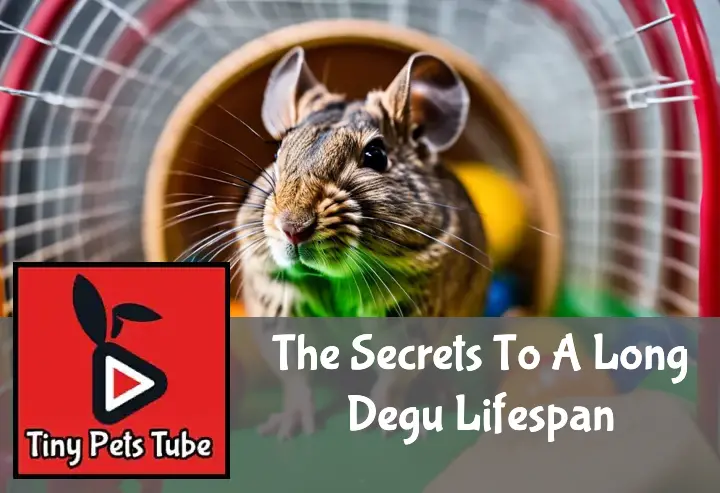Ever heard of a Degu? No, it’s not some exotic dish or the latest dance craze. It’s an adorable little rodent native to Chile! They’re quite the charmers with their big eyes and bushy tails. But what really makes them special is their Long Degu Lifespan.
Now, if you’re thinking about adopting one (or maybe you already have), you’d definitely want to know how to keep these cuties around for as long as possible, right? Well, you’re in luck! Keep reading about The Secrets To A Long Degu Lifespan. Trust me, it’s worth every minute of your time!
Key Takeaways
- Degus have a lifespan of 6-8 years, which can be extended with proper care.
- A balanced diet is crucial; feed them high-quality guinea pig or chinchilla food, fresh vegetables, and occasional treats.
- Regular exercise and mental stimulation are essential for their health. Provide toys and running wheels in their habitat.
- Regular vet check-ups can help detect any health issues early.
- Avoid stressors such as sudden changes in environment or diet, as these can negatively impact their lifespan.

What is a Degu?
Degus are charming little critters that hail from Chile. They’re part of the small rodent species gang and have been winning hearts as pets worldwide. With their sociable nature and intriguing behaviors, degus offer a unique blend of companionship and entertainment. They’re not just cute faces; their Degu characteristics like sharp teeth, long tails, and curious eyes tell tales of survival and adaptability. As we dive into understanding these fascinating creatures, we’ll explore everything from their origin of degus to how they manage to live longer under human care compared to the wild.
Understanding the Degu Species
Diving into the world of degus, it’s fascinating to learn about their taxonomy which places them in a unique spot among small rodents. Originating from the semi-arid regions of Chile, these critters have adapted to a life that requires keen social interactions within their groups. The natural habitat of degus has shaped much about them, including their diet which predominantly consists of seeds and plants. This dietary habit is crucial for potential owners to understand as it directly impacts their health and wellbeing. Moreover, the social behavior of degus is something that sets them apart; they thrive in communities, indicating that having more than one might just keep them happier and healthier.
Lifespan of a Degu in Captivity vs Wild
When talking about the long Degu lifespan, it’s quite an eye-opener to compare their years in captivity versus the wild. On average, a well-cared-for degu can live up to 8 years under human care, which is significantly longer than their wild counterparts who often reach only half that age due to predation and harsh living conditions. Factors such as diet play a monumental role in this difference; captive degus often have access to balanced nutrition free from the risks of predators lurking around every corner. Additionally, healthcare availability ensures that any signs of illness are promptly addressed, further contributing to their extended lifespan in captivity compared to those braving it out in the wild.
What Factors Influence a Degu’s Lifespan?
Understanding the factors that influence a long Degu lifespan is crucial for any degu owner. It’s not just about love and care; genetics, environment, and diet play key roles too.
Genetic Factors
When it comes to the longevity of your furry friend, degu genetics can’t be ignored. Just like us humans, degus inherit traits from their parents, including those that might affect their health. Some degus might be predisposed to certain hereditary diseases, making responsible breeding practices super important. By focusing on genetic diversity in pets, breeders can help reduce the risk of these inherited health conditions in degus. It’s all about giving your little buddy the best shot at a long and healthy life by understanding and managing their genetic background.
Environmental Factors
Believe it or not, where your degu calls home has a massive impact on its wellbeing. A well-set-up habitat with plenty of room to run, dig, and explore is essential for keeping them happy and healthy. Think of it as creating a mini adventure park for them! Environmental enrichment for degus isn’t just about fun; it also reduces stress, which is a big deal since stress can seriously mess with their health. So, by crafting a safe and stimulating living space filled with toys and hiding spots, you’re not just being a cool pet parent—you’re directly contributing to your degu’s longer life.
Dietary Factors
Let’s talk grub! A balanced diet is pretty much the cornerstone of extending your degu’s life expectancy. These little guys have specific nutritional needs that must be met for them to thrive. Incorporating a variety of foods while steering clear of harmful ones is key. Fresh hay should be the mainstay of their diet alongside quality pellet food designed specifically for degus. Veggies? Yes please—but only in moderation to avoid diabetes, a common issue among these critters. Remember, achieving the right balance between variety and nutritional value in their diet isn’t just good practice; it’s essential for keeping your fluffy friend around for as long as possible.

How Can You Enhance Your Degu’s Lifespan?

To boost your degu’s chances at a long Degu lifespan, focus on their diet, exercise, and mental well-being. Let’s dive into how you can make this happen.
Providing a Balanced Diet
A balanced degu diet is like hitting the jackpot for extending your furry friend’s life. Imagine a buffet but for degus, where everything is nutritious and tailored just for them. Start with high-quality hay, which should be the main event of their meals. It keeps their digestive system in tip-top shape.
Next up, sprinkle in some fresh veggies – think leafy greens and bell peppers, but dodge anything sugary like fruits or carrots. These are the secret treats that are more trick than treat due to their high sugar content. For the pièce de résistance, add specialized degu pellets that meet all the nutritional needs of degus without any harmful extras.
Steer clear from anything with sugar or those sneaky harmful foods for degus like sunflower seeds and nuts; they’re like fast food for these little guys – tempting but terrible in the long run.
Ensuring Regular Exercise
Degus are little balls of energy; they need to sprint, jump, and play to keep fit. A spacious cage with multiple levels is a great start, giving them room to explore and move around. Think of it as their personal gym.
Add a wheel for those late-night runs (make sure it’s solid without any gaps to protect their tiny feet). Then, take things up a notch with tunnels and platforms that encourage climbing and exploration – it’s like an obstacle course they can’t get enough of.
Don’t forget about playtime outside the cage too. Supervised freedom in a safe room lets them satisfy their curiosity and stretch those legs even further. It’s not just about physical health; this kind of physical activity for degus also keeps them happy.
Offering Mental Stimulation
Just like us, degus get bored if they don’t have enough to do. That’s where mental stimulation for degus comes into play. Interactive toys? Check. Puzzle feeders that make them work for their treats? Double-check.
Rotate toys regularly to keep things fresh; imagine having only one book to read forever – no thank you! Setting up a dig box filled with safe bedding allows them to burrow and search hidden treasures (aka treats), mimicking their natural behavior.
Engage with your degu through gentle handling sessions or teach them simple tricks; it strengthens your bond while keeping their brain ticking. Remember, a mentally stimulated degu is a happy (and healthy) degu.
What are the Common Health Issues in Degus and How to Prevent Them?
Degus, those adorable little critters, aren’t just cute; they’re also a bit like tiny health puzzles. Keeping them in tip-top shape involves knowing about degu health issues and nipping potential problems in the bud with some savvy degu care tips.
Dental Problems and Prevention
When it comes to degu dental care, think of their teeth as tiny ticking time bombs. Improper diet is often the culprit behind these dental disasters. But fear not! Preventing dental problems in degus is doable with a bit of know-how. First off, their chompers grow continuously, so a diet that lets them gnaw and wear down those pearly whites is key. Think hay, hay, and more hay!
Next up, keep an eye out for signs of dental disease in degus. Drooling or difficulty eating? Red flag! Regular check-ups can catch issues early on. Remember, a degu diet for healthy teeth isn’t just good practice; it’s essential for preventing a world of mouthy woes.
Diabetes and Prevention
Now onto something sweet but not so sweet for our furry friends: diabetes. It’s all too easy for degus to slip into this sugary trap through an inappropriate diet loaded with treats and lacking in fibrous goodies. The trick to preventing diabetes in degus? A balanced diet that’s low on sugar and high on complex carbs—think whole grains and veggies.
Spotting the signs of diabetes in degus early can make all the difference. Excessive thirst or peeing more than usual? Time to consult the vet. With careful management, including a healthy diet for degus, you can keep your fluffy buddy bouncing around without the sugar crash.
Respiratory Issues and Prevention
Breathing easy isn’t always a given for our degu pals, especially when common respiratory problems lurk around every corner (or bedding pile). Dusty environments or chilly drafts can turn their cozy home into a hazard zone real quick.
To keep their lungs as clear as their adorable eyes, focus on preventing respiratory issues in degus by maintaining clean living conditions—frequent bedding changes are your new best friend here. Also, steer clear of placing cages near windows or doors where drafts might sneak in. Keeping an eye out for symptoms of respiratory disease in degus like wheezing or labored breathing will help ensure your little guy keeps huffing and puffing happily during playtime—and that’s what we want! After all, ensuring maintaining healthy air for degus is just part of loving these quirky critters right.
How Regular Vet Check-ups Contribute to a Long Degu Lifespan?
Believe it or not, those vet visits you dread scheduling are your secret weapon in the battle for a long Degu lifespan. It’s all about keeping your furry friend in tip-top shape.
Importance of Regular Vet Visits
Ever wondered why those routine vet visits are a big deal? Well, they’re like the health detectives for your degu. These check-ups are crucial for preventive degu care, ensuring your little buddy stays healthy and happy. By catching issues early, vets can often prevent small problems from becoming big headaches. Think of it as an investment in your degu’s future, where routine vet visits for degus play a starring role in their overall well-being.
Regular appointments aren’t just about getting shots; they’re an opportunity for degus health maintenance. Your vet can give you the lowdown on diet, exercise, and even dental care tailored specifically to your degu’s needs. Plus, these visits reinforce the bond between pet and vet, making future appointments less stressful for everyone involved. The benefits of regular vet check-ups can’t be overstated—they’re essential for veterinary care for long-lived degus.
Early Detection of Potential Health Issues
Catching things early is pretty much the golden rule when it comes to degu health. During those check-ups, vets have a knack for spotting trouble before it starts—whether it’s dental issues or something more sinister like diabetes. This early detection in degus means you can tackle problems head-on, often with simpler and less invasive treatments.
Knowing the common degu health issues helps you stay one step ahead. Weight changes, unusual eating habits, or a dip in energy levels? These could be red flags that something’s up. Vets use these clues along with advanced veterinary screening for degus to catch diseases early on.
Managing degu diseases early is key to preventing complications down the road. It’s not just about extending their lifespan; it’s about enhancing their quality of life too. So next time you notice any odd signs of illness in your degu, remember that prompt veterinary intervention could make all the difference.

To Wrap Up
In a nutshell, keeping your Degu tickety-boo for the long haul isn’t rocket science. Just like us, they need a balanced diet, regular exercise and mental stimulation. And remember to keep an eye out for any changes in their behaviour or appearance.
Most importantly, love ’em up! Because nothing beats the power of TLC when it comes to a Long Degu Lifespan. So here’s to many more years with your whiskered pals!


